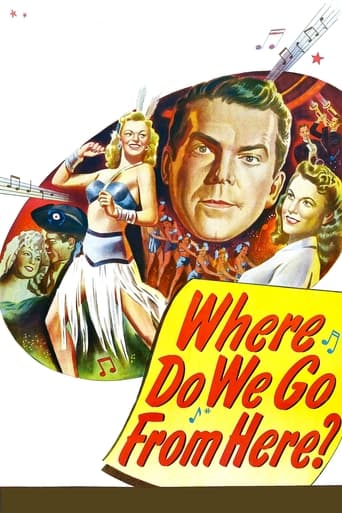edwagreen
Anachronisms abound in this 1945 film. Fred MacMurray actually sings here and he does a good job at it.The story of a man who is physically unfit to serve during World War 11 is transported back in time by a genie who can't seem to get him back to modern day.First, going back to the Revolutionary War Days, it was ridiculous and offensive to hear the Hessians saluting in the Nazi way.We see MacMurray with Columbus and the Indians as well as with the settlements of New Amsterdam.June Haver and Joan Leslie provide the love interests and Anthony Quinn appears as an Indian in the film.
utgard14
Fred MacMurray plays a guy who wants to do his patriotic duty and join the Army but he's 4F so they won't take him. To make matters worse, the girl he loves (June Haver) only dates soldiers. One night Fred frees a genie from a lamp and the genie grants him wishes in return. He wishes to be in the Army but the genie misunderstands and sends him back in time to join the Army of George Washington. From there, Fred bounces around in time to earlier points in American history where he sails with Columbus, buys Manhattan from Anthony Quinn, and hangs around with Dutch settlers who talk like Yoda. Well this was an interesting little gem I'd never heard of. It's a pleasant Technicolor musical comedy with songs by Ira Gershwin and Kurt Weill. Fred MacMurray is amiable and easygoing. Joan Leslie is lovable as the girl best friend that is, of course, perfect for Fred but he doesn't see it yet. June Haver does fine in a role that would be easy to hate in a more serious movie. Fred and June met while making this and were later married. The songs are cute but nothing terribly impressive. Wait until you see MacMurray dance. Don't quit your day job, Fred! The Christopher Columbus operetta is probably the highlight. Enjoyable wartime fantasy that's very light and charming. Fun but never quite as good as it seems like it could be. Still, if you're a fan of the stars or old-school musicals you should like it.
guyzell42
Saw it as many times as I could before it left the scene. A delightful and entertaining film with some of my very favorite stars. Only wish I could find it again! Would certainly buy/view it if I could. Please, somebody, bring it back. Fred MacMurray was perfect in his role as a patriot during World War II, and his leading ladies, Joan Leslie, and especially June Haver were beautiful and charming. It was a musical, but also romantic, funny, and clever. This was my favorite movie starring June Haver, although I always liked her. Her dazzling smile lit up the screen, and her beauty and talent were an asset to any film. The supporting cast lent credit to their individual roles. A well-balanced and light-hearted film; only wish we had more like it!
Charles Reichenthal
During a Kurt Weill celebration in Brooklyn, WHERE DO WE GO FROM HERE? was finally unearthed for a screening. It is amazing that a motion picture, from any era, that has Weill-Gershwin collaborations can possibly be missing from the screens. The score stands tall, and a CD of the material, with Gershwin and Weill, only underscores its merits, which are considerable. Yes, the film has its problems, but the score is not one of them. Ratoff is not in his element as the director of this musical fantasy, and Fred MacMurray cannot quite grasp the material. Then, too, the 'modern' segment is weakly written. BUT the fantasy elements carry the film to a high mark, as does the work of the two delightful leading ladies - Joan Leslie and June Haver. Both have the charm that this kind of work desperately needs to work. As a World War II salute to our country's history - albeit in a 'never was' framework, the film has its place in Hollywood musical history and should be available for all to see and to find its considerable merits.



